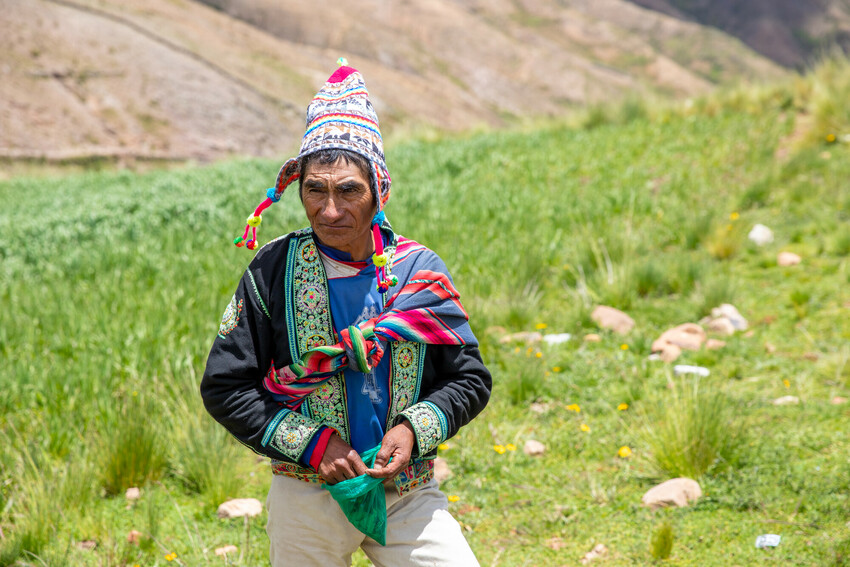The New Frontier of Climate and Peace

Valentin Aguilar Ordañez is a farmer living in the remote community of San Pedro where he has noticed the effects of climate change. MCC photo/Annalee Giesbrecht
At Mennonite Central Committee (MCC), we often say that for us peace is not just a wish. It is at the heart of our faith, and has been our work for over 100 years.
But a year ago, after hearing our partners across the world tell us about the relationship between conflict and climate in their local communities, MCC launched a Climate Action for Peace campaign. It was our first time to connect the two challenges.
This positions MCC well to influence a new United Nations focus called “climate, peace, and security.”
It was European countries who first named the links between climate and security, a word the UN uses to speak of the international and individual country’s responsibility for the survival, livelihood, and dignity of their people. But adding peace would not have happened without the strong voices of countries where climate multiplies the risk of conflict, such as small island developing states. One of them, the Pacific Island nation of Vanuatu, took a case to the International Court of Justice, asking for a ruling on who bears responsibility for climate change. Many of them organized the "Group of Friends" on climate and security, which is now seventy members strong. They keep reminding the world of the great irony that those who contribute the least to climate change bear the brunt of its impact and that they're often within fragile or conflict settings.
The UN Security Council, the world’s most powerful international body, hotly debated whether to add climate, peace and security to their agenda. Eventually the Council acknowledged that climate was a “risk multiplier” in certain country or regional contexts, saying that climate impacts other sources of conflict within countries and regions and adds to conditions that jeopardize peace. A major step was taken in 2018 for three UN entities to establish the Climate Security Mechanism to gather data and strategize around addressing this intersection, deploying Climate Peace and Security Advisors.
Since adopting this priority, for the first time the Security Council recognized that a number of climate-stressed regions and countries also have peace-related political or peacekeeping operations. A UN factsheet describes how the two are related:
Where climate change dries up rivers, reduces harvests, destroys critical infrastructure, and displaces communities, it exacerbates the risks of instability and conflict, in particular in contexts where conflict and fragility have weakened coping capacities. Climate change causes increased competition for resources and more erratic weather. This unpredictability leads to peace and security issues. Rising sea levels bring up questions of sovereignty. Debates over international borders are raging in the Arctic Circle, as countries clamor to claim resources.
MCC sees similar linkages in places like the border between Kenya and Uganda, where climate change is reducing arable land. MCC partners report that farmer-herder armed conflicts are becoming more frequent as both groups try to find land that can support life. In places like Bolivia and Cambodia, floods, drought, and other climate-induced natural events are causing mass displacement and creating large groups of internally displaced people.
“We see continued economic losses and the migration of our young people to the cities. This worries us because city life isn’t easy and there are fewer people to live and work in our communities,” says Valentine Aguilar Ordañez, a farmer working with MCC in San Pero, Bolivia.
Support is growing globally to support climate action and peace.
Last year when 80,000 participants attended the UN's twenty-eighth annual climate change conference in the United Arab Emirates (known as “COP28”), countries reached an agreement on the Climate Relief, Recovery, and Peace Declaration. This year the theme of the UN Biodiversity Conference is Peace With Nature and is being held in Colombia, a country that has reckoned simultaneously with civil strife and security threats from climate. And one topic of the UN Conference on Combating Desertification in Saudi Arabia, will be peace forest initiatives.
At the UN in New York where MCC’s UN office works, the Climate Security Mechanism is connecting the dots between UN organizations working on hunger, refugees, migration, and human rights. One UN official I spoke to for this article called this work a "bright spot for cooperation."
Still, too often there is a disconnect between the announcements of world leaders and the reality of supporting countries who are most affected. It is people in local communities who experience the justice gap between those most and least affected most intensely.
More platforms for their voices are emerging. At COP27 in Egypt, UN Secretary General Guterres organized a UN Youth Forum. One participant, Archana Soreng, a member of the Kharia tribe in Odisha, India, addressed the entire COP27 audience. “Young people, local communities, indigenous people, women and girls, should be leaders of climate action and not victims of climate policies,” she said.
The new frontier of climate, peace, and security provides an opportunity for organizations like MCC to connect our partners with policymakers to ensure that the voices of those most affected, like Archana and her community, are heard in the halls of global decision makers.
Victoria Alexander serves as Advocacy Associate with the MCC United Office in New York City. A native of North Carolina, Victoria is a member of the Presbyterian Church USA and a board member of Presbyterian Women.

